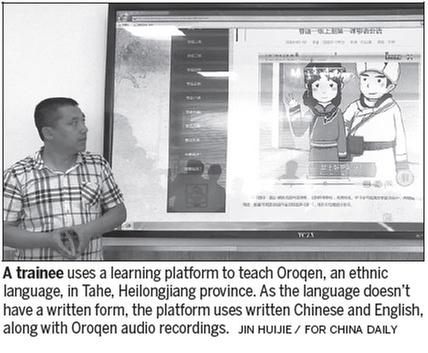Platform preserves a disappearing ethnic language

Heilongjiang province is launching a project to encourage more people to use the internet to learn the steadily dwindling languages of some ethnic groups.
The first course in the use of a learning platform for the preservation of the Oroqen language and culture in northeastern China concluded recently in Tahe county. The two-day course attracted about 60 representatives, including experts, officials, teachers and Oroqen people.
The language is only spoken; it has no written form. There are about 3,900 Oroqen people in Heilongjiang, accounting for 45 percent of all Oroqen people nationwide.
Although there are no exact numbers, research indicates that there are "very few people who can speak the Oroqen language", said Liu Jie, who planned the project. "Most people younger than 50 do not speak the language anymore."
"Despite government efforts to protect minority languages, these languages are in danger of disappearing due to modernization," said the retired civil servant, who works for the provincial ethnic affairs authority.
Starting in June last year, the Heilongjiang Ethnic Affairs Commission began to build an online platform offering free learning materials to those interested in learning the dying ethnic language. After a year's trial run, the platform was officially rolled out in late July.
"Through the platform, anyone who registers can obtain free learning sources, including recordings based on the textbook, vocabulary in Chinese and English, and cultural displays," he said.
To promote the use of the platform, the commission organized a training course and received positive responses.
"It is a platform that can provide accurate and scientific learning methods for those who want to study the language," said Guan Jinfang, 62, a master of Oroqen folk songs, dancing, traditional costumes and paper-cutting, as well as Shaman dancing and costume.
"The older people, like me, can speak it fluently," she said. "But the younger generations of Oroqen are becoming similar to the Han people, and few of them can speak the Oroqen language. I hope the Oroqen traditions can be continued generation by generation.
"Furthermore, in the internet era, the platform provides easy access to spread the Oroqen language and culture all around the world."
Mo Renjie, 21, a junior at Wuhan University of Technology, is an Oroqen from Heilongjiang. He said he is ashamed every time a classmate asks him to speak his ethnic language.
"I can only speak several words in Oroqen due to the lack of a language environment and good learning methods," he said. "I registered on the platform the first time I heard about it, and I will introduce the platform to my classmates."
Liu, the platform project planner, said more training courses will be organized. In the next stage, his team will expand the platform to include other ethnic minority languages, including Hezhe, Daur, Ewenki, Kirgiz, Xibe.

- Survivor of Japan's 'comfort women' system dies
- 19 foreigners among China's first officially certified hotpot chefs
- China approves new lunar sample research applications from institutions
- Fishing, Hunting festival opens at Chagan Lake in Jilin
- A glimpse of Xi's global insights through maxims quoted in 2024
- China's 'Ice City' cracks down on ticket scalping in winter tourism




































